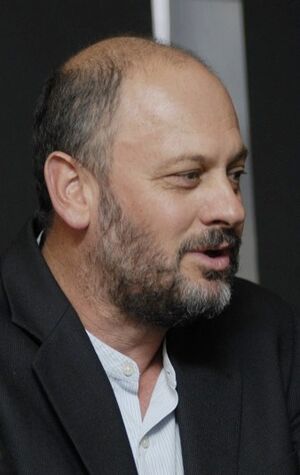Difference between revisions of "Tim Flannery"
(stub) |
(unstub) |
||
| Line 1: | Line 1: | ||
{{person | {{person | ||
|wikipedia=https://en.wikipedia.org/wiki/Tim_Flannery | |wikipedia=https://en.wikipedia.org/wiki/Tim_Flannery | ||
| − | |constitutes= | + | |constitutes=public scientist |
|ON_constitutes=climate expert | |ON_constitutes=climate expert | ||
|image=Tim Flannery.jpg | |image=Tim Flannery.jpg | ||
| Line 10: | Line 10: | ||
|death_date= | |death_date= | ||
|death_place= | |death_place= | ||
| − | |description= | + | |description=Australia's most high profile "climate expert" and ecologist. |
|parents= | |parents= | ||
|spouses= | |spouses= | ||
| Line 29: | Line 29: | ||
}} | }} | ||
}} | }} | ||
| − | '''Timothy Fridtjof Flannery''' is an Australian [[palaeontologist]], [[environmentalist]], [[Conservation biology|conservationist]],<ref>https://www.bbc.co.uk/programmes/b00z58b0</ref> | + | '''Timothy Fridtjof Flannery''' is an Australian [[palaeontologist]], [[environmentalist]], [[Conservation biology|conservationist]],<ref>https://www.bbc.co.uk/programmes/b00z58b0</ref>, author, [[Science communication|science communicator]], activist and public scientist. He was awarded [[Australian of the Year]] in 2007 for his work and advocacy on environmental issues. His predictions led to the building of hugely expensive [[desalination plants]] that immediately turned out were not needed. |
| + | ==No more rain== | ||
| + | In a [[2005]], Flannery made expert predictions that led to the building of expensive [[desalination plants]] in all Australian capital cities except [[Hobart]]: "Over the past 50 years southern Australia has lost about 20 per cent of its rainfall, and one cause is almost certainly [[global warming]]...But by far the most dangerous trend is the decline in the flow of Australian rivers: it has fallen by around 70 per cent in recent decades, so [[dams]] no longer fill even when it does [[rain]]. Growing evidence suggests that hotter [[soils]], caused directly by global warming, have increased evaporation and transpiration and that the change is permanent. ....Desalination plants can provide insurance against drought. In [[Adelaide]], [[Sydney]] and [[Brisbane]], water supplies are so low they need desalinated water urgently, possibly in as little as 18 months Of course, these plants should be supplied by [[net zero|zero-carbon]] power sources."<ref>https://web.archive.org/web/20080724231340/http://science.org.au/nova/newscientist/105ns_001.htm</ref> | ||
| + | In [[Queensland]], the [[Peter Beattie]] [[Australian Labor Party|Labor government]] built a $1.126 billion desalination plant based on these predictions. The [[Victorian]] Labor Government cited the same reason for building its own $5.7 billion plant. By 2010, the plants were mothballed for lack of need<ref>https://www.heraldsun.com.au/blogs/andrew-bolt/queensland-scraps-the-desal-plant--tim-flannery-sold-as-essential/news-story/e8529d671fba520faae3f4feeb45c4ae</ref><ref>https://spectator.com.au/2022/07/water-its-always-too-much-or-not-enough/</ref>. | ||
| + | |||
| + | The push for unaffordable desalination plants was possibly in part driven by the as a [[scam]] by the construction and banking industry, in order to extract public money by building debt-financed white elephants.{{cn}} | ||
{{SMWDocs}} | {{SMWDocs}} | ||
==References== | ==References== | ||
{{reflist}} | {{reflist}} | ||
| − | |||
Latest revision as of 10:02, 13 October 2022
| "climate expert" (public scientist) | |||||||||||||||||||||
|---|---|---|---|---|---|---|---|---|---|---|---|---|---|---|---|---|---|---|---|---|---|
 | |||||||||||||||||||||
| Born | 28 January 1956 | ||||||||||||||||||||
| Nationality | Australian | ||||||||||||||||||||
| Alma mater | La Trobe University | ||||||||||||||||||||
Australia's most high profile "climate expert" and ecologist.
| |||||||||||||||||||||
Timothy Fridtjof Flannery is an Australian palaeontologist, environmentalist, conservationist,[1], author, science communicator, activist and public scientist. He was awarded Australian of the Year in 2007 for his work and advocacy on environmental issues. His predictions led to the building of hugely expensive desalination plants that immediately turned out were not needed.
No more rain
In a 2005, Flannery made expert predictions that led to the building of expensive desalination plants in all Australian capital cities except Hobart: "Over the past 50 years southern Australia has lost about 20 per cent of its rainfall, and one cause is almost certainly global warming...But by far the most dangerous trend is the decline in the flow of Australian rivers: it has fallen by around 70 per cent in recent decades, so dams no longer fill even when it does rain. Growing evidence suggests that hotter soils, caused directly by global warming, have increased evaporation and transpiration and that the change is permanent. ....Desalination plants can provide insurance against drought. In Adelaide, Sydney and Brisbane, water supplies are so low they need desalinated water urgently, possibly in as little as 18 months Of course, these plants should be supplied by zero-carbon power sources."[2]
In Queensland, the Peter Beattie Labor government built a $1.126 billion desalination plant based on these predictions. The Victorian Labor Government cited the same reason for building its own $5.7 billion plant. By 2010, the plants were mothballed for lack of need[3][4].
The push for unaffordable desalination plants was possibly in part driven by the as a scam by the construction and banking industry, in order to extract public money by building debt-financed white elephants.[citation needed]
A Quote by Tim Flannery
| Page | Quote |
|---|---|
| Document:The Corporate Climate Coup | “"The most important thing to realize," Flannery echoes, “is that we can all make a difference and help combat climate change at almost no cost to our lifestyle." “The transition to a carbon-free economy is eminently achievable,” he exults, "because we have all the technology we need to do so.” "One great potential pitfall on the road to climate stability," he warns, however, "is the propensity for groups to hitch their ideological wagon to the push for sustainability.” "When facing a grave emergency,” he advises, “it's best to be single-minded." The book is inspiring, rallying the reader to battle against this global threat with ingenuity, enthusiasm, and hopefulness, except for one small aside, buried in the text, that gnaws at the attentive reader: “because concern about climate change is so new, and the issue is so multi-disciplinary," Flannery notes, “there are few true experts in the field and even fewer who can articulate what the problem might mean to the general public and what we should do about it.”” |
References
- ↑ https://www.bbc.co.uk/programmes/b00z58b0
- ↑ https://web.archive.org/web/20080724231340/http://science.org.au/nova/newscientist/105ns_001.htm
- ↑ https://www.heraldsun.com.au/blogs/andrew-bolt/queensland-scraps-the-desal-plant--tim-flannery-sold-as-essential/news-story/e8529d671fba520faae3f4feeb45c4ae
- ↑ https://spectator.com.au/2022/07/water-its-always-too-much-or-not-enough/